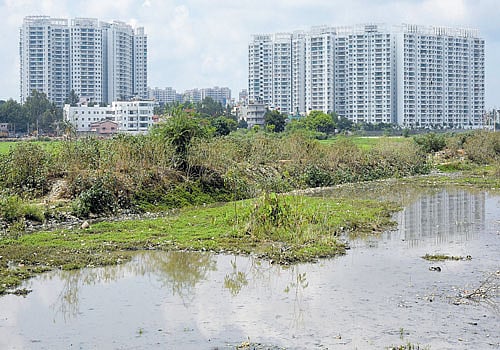Pollution control board agrees to upload all lake info online
Last Updated IST

Sridhar Pabbisetty from Namma Bengaluru Foundation claimed that only people with political connections were members of the lake watchdog committee and that the board had omitted those working relentlessly to conserve lakes.
The Karnataka State Pollution Control Board (KSPCB) has promised to upload on its website information related to No Objection Certificates (NoCs) issued to industries and residential buildings, the list of members in its lake watchdog committee as well as real-time air and water quality analysis.
It was an immediate assurance given by KSPCB Chairman Lakshman to lake conservationists and non- governmental organisations (NGO), which sought transparency in the board’s functioning at a meeting here on Wednesday.
Prof Arbind Gupta from Save Bangalore Lakes Trust wanted to know the status of all private and public sewage treatment plants through which at least of half of the treated water gets into the lakes. “If this information is published on the website, citizens can check its accuracy,” he said.
Kavita Reddy, lake activist and member of Agara Lake Protection and Management Committee, urged the board to put in place a consistent mechanism for analysing the quality of water. “Put it on the website and let it be known to the public,” she said.
Ram Prasad from Friends of Lake doubted the KSPCB’s efficiency to tackle pollution. How many criminal cases have you filed to tackle pollution, he asked and suggested that the details were not made public to “hide wrongdoing.”
Sridhar Pabbisetty from Namma Bengaluru Foundation claimed that only people with political connections were members of the lake watchdog committee and that the board had omitted those working relentlessly to conserve lakes. Elangovan from Whitefield Rising concurred and demanded to know the names of the committee members.
Among other suggestions, K S Bhat, a retired professor, urged the board to act on complaints and not wait for the court order. “There is no co-ordinated action by government agencies to rejuvenate lakes. The release of sewage into the lakes and encroachment are major issues, which is not being addressed properly. Nobody is interested,” he said, describing them as “unwilling brides”.
He also suggested that the board introduce a lake adoption scheme and invest in lakes. “One rupee spent on a lake is equal to two rupees on other water sources,” Bhat said and supported a single window instead of multiple civic agencies.
Prof V Jagannatha, a scientist from Isro, urged the KSPCB to prepare an urban watershed management plan to rejuvenate lakes. A teacher from Varthur urged the members to set up a water quality testing centre in her school so that the local people can know the quality of water they drink.
It was an immediate assurance given by KSPCB Chairman Lakshman to lake conservationists and non- governmental organisations (NGO), which sought transparency in the board’s functioning at a meeting here on Wednesday.
Prof Arbind Gupta from Save Bangalore Lakes Trust wanted to know the status of all private and public sewage treatment plants through which at least of half of the treated water gets into the lakes. “If this information is published on the website, citizens can check its accuracy,” he said.
Kavita Reddy, lake activist and member of Agara Lake Protection and Management Committee, urged the board to put in place a consistent mechanism for analysing the quality of water. “Put it on the website and let it be known to the public,” she said.
Ram Prasad from Friends of Lake doubted the KSPCB’s efficiency to tackle pollution. How many criminal cases have you filed to tackle pollution, he asked and suggested that the details were not made public to “hide wrongdoing.”
Sridhar Pabbisetty from Namma Bengaluru Foundation claimed that only people with political connections were members of the lake watchdog committee and that the board had omitted those working relentlessly to conserve lakes. Elangovan from Whitefield Rising concurred and demanded to know the names of the committee members.
Among other suggestions, K S Bhat, a retired professor, urged the board to act on complaints and not wait for the court order. “There is no co-ordinated action by government agencies to rejuvenate lakes. The release of sewage into the lakes and encroachment are major issues, which is not being addressed properly. Nobody is interested,” he said, describing them as “unwilling brides”.
He also suggested that the board introduce a lake adoption scheme and invest in lakes. “One rupee spent on a lake is equal to two rupees on other water sources,” Bhat said and supported a single window instead of multiple civic agencies.
Prof V Jagannatha, a scientist from Isro, urged the KSPCB to prepare an urban watershed management plan to rejuvenate lakes. A teacher from Varthur urged the members to set up a water quality testing centre in her school so that the local people can know the quality of water they drink.
